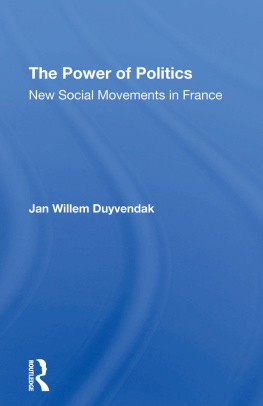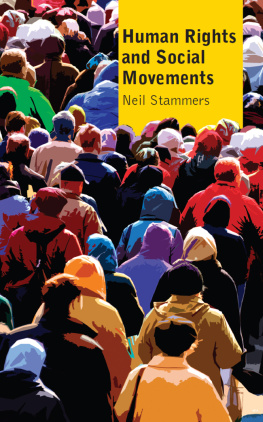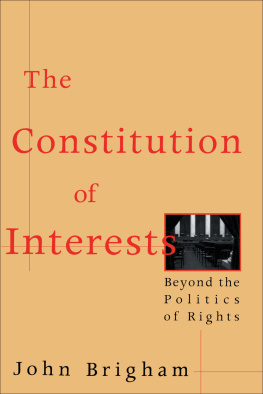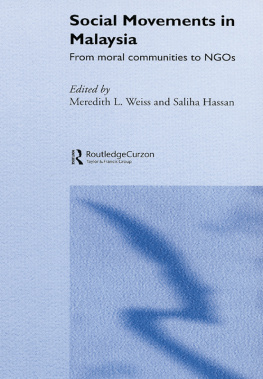The Power of Politics
The Power of Politics
New Social Movements in France
Jan Willem Duyvendak
First published 1995 by Westview Press, Inc.
Published 2019 by Routledge
52 Vanderbilt Avenue, New York, NY 10017
2 Park Square, Milton Park, Abingdon, Oxon OX14 4RN
Routledge is an imprint of the Taylor & Francis Group, an informa business
Copyright 1995 Taylor & Francis
All rights reserved. No part of this book may be reprinted or reproduced or utilised in any form or by any electronic, mechanical, or other means, now known or hereafter invented, including photocopying and recording, or in any information storage or retrieval system, without permission in writing from the publishers.
Notice:
Product or corporate names may be trademarks or registered trademarks, and are used only for identification and explanation without intent to infringe.
A CIP catalog record for this book is available from the Library of Congress.
ISBN 13: 978-0-367-29529-5 (hbk)
For Rommel Mendes Leite
Contents
- PART ONE
NEW SOCIAL MOVEMENTS - PART TWO
NEW SOCIAL MOVEMENTS AND THE FRENCH POLITICAL OPPORTUNITY STRUCTURE - PART THREE
NEW SOCIAL MOVEMENTS IN FRANCE - PART FOUR
CONCLUSIONS
Guide
I remember very well the question-mark faces in France when I said that I was doing research on the development of "new social movements" in their country; You, a Dutchman? New social movements in France? In the 1980s? Indeed, writing a book about a non-issuethese movements had almost disappeared after 1981as a foreign scholar was not the easiest job. Although I was convinced that to explain what had happened to French new movements was interestingin particular in comparison to the flourishing development of these movements in the Netherlands, Germany and Switzerlandthe people I interviewed did not seem to share this opinion. Their disillusion and bitterness about both the "betrayal" of the left-wing government and the disengagement of their fellow countrymen did not really increase their willingness to participate in this research project. Therefore, I am all the more grateful to all movement participants who finally did expose themselves to hundreds of questions about their organizations and French political life. I hope they recognize their analyses in the book. Apart from these interviews, I had many discussions with Parisian scholars that helped me a lot to understand the worlds of social movements and social science in France. Ben Cramer, Szusza Hegedus, Michel Maffesoli, Pierre Rosanvallon, Jacques Theys and in particular Rommel Mendes Leite and the late Michael Pollak have been very supportive in this respect.
Also in Amsterdam, there have been many persons and organizations without which this book would never have been written. In the first place, I am grateful for the (financial) support of the Erasmus organization, NWO, the department of political science and the Amsterdam School for Social Research, both of the University of Amsterdam. Moreover, I would like to thank Kees van aar and Gabriella Breebaart for their accurate and enthusiastic participation in the empirical part of the research. Extremely cooperative was my English editor Kevin N. Martley, who performed the unrewarding task of correcting my kind of English in my type of planning. He did a lot of night work. I would like to thank Errol Graf, who prepared the final camera-ready version of the manuscript. Yves-Brieuc Cadat, Tibor Dessewffy, Stefan Dudink, Meindert Fennema, Hans Goedkoop, Ido de Haan, Gert Hekma, Sonja van 't Hof, Annemarie Mol, Rob Tielman and Odile Verhaar all provided me with stimulating comments on parts of this book. Discussions in the Amsterdam Research Committee on New Social Movements, in the section of political scientists and historians of the Amsterdam School, and in particular in our project group, the so-called Rhine group (Marco G. Giugni, Hein-Anton van der Heijden, Ruud Koopmans, Hanspeter Kriesi and Florence Passy), all contributed enormously to the development of the main argument of this book. Without the ideas, the incentive and perseverance of Hanspeter Kriesi this project would never have developed, let alone the part on France. Also, I have very much appreciated Professor Schuyt's encouraging comments in the last phase of the project. Last but not least, I will express my gratitude for the intense cooperation with Ruud Koopmans: this has been a decisive factor in the writing of this book.
Finally. Falling in love with somebody who is either absent due to visits to a foreign country or absent-minded because of working on his book is not very romantic. That this book owes therefore most to Menno van Leeuwen goes without saying.
Jan Willem Duyvendak
Part One
New Social Movements
1
The Movements That Vanished
Ever since the revolution of 1789, France has been seen as a country characterized by protest waves and violent interactions between a strong state and an underdeveloped civil society. The events of 1830, 1848 and 1871 fitted into the picture of a particular French tradition, which drew its inspiration and rhetoric from The French Revolution. Burke, for instance, wrote about the French: "It is ordained in the eternal constitution of things, that men of intemperate minds cannot be free. Their passions forge their fetters." (cited in Hirschman, 1991:106) Other telling examples are: "Mass demonstrations and processions have always been a traditional French means of expressing support of protest" (Wright, 1989:262); "France: Nothing but Opposition" (according to the title of an article written by Grosser 1966); or "Protest (w)as a way of life," as described by Hoffmann (1974).
The events of May' 68 in Paris once more confirmed the idea of France as the mother of all revolutions. "The occasion in May 1968 when students erected barricades in the boulevards of Paris and fought pitched battles with the CRS still stands in popular imagination as the apogee of the international student revolt." (Rootes, 1982:17) The early development of a strong antinuclear movement during the 1970s only served to confirm this image, and France appeared as the prototypical country for "new social movements" (NSMs), a term not coincidentally coined in this country. "During the 1970s, France was not only one of the countries in which the NSMs were strongly developed ..., it even "exported" its movements to other countries." (Leggewie, 1985:135)
During the 1980s however, political mobilization seemed to have vanished. Particularly the NSMs experienced a sharp decline. French postindustrial society did not eventuate the emergence of a strong new movement, as was predicted by the leading sociologist Alain Touraine. Without entering into a discussion of the type of society foreseen by Touraine, it is evident that the NSMs have not been the carriers of a postindustrial, postmaterialist or programmed society. Perhaps French society has become more "programmed," but if this be the case then we can only conclude that this has been at the expense of NSMs.
How to understand this? Should the image of France as a country in permanent turmoil be corrected in general: has the traditional image been inadequate from the start? Or should we look for a more specific explanation with regard to the decline of the new social movements?









